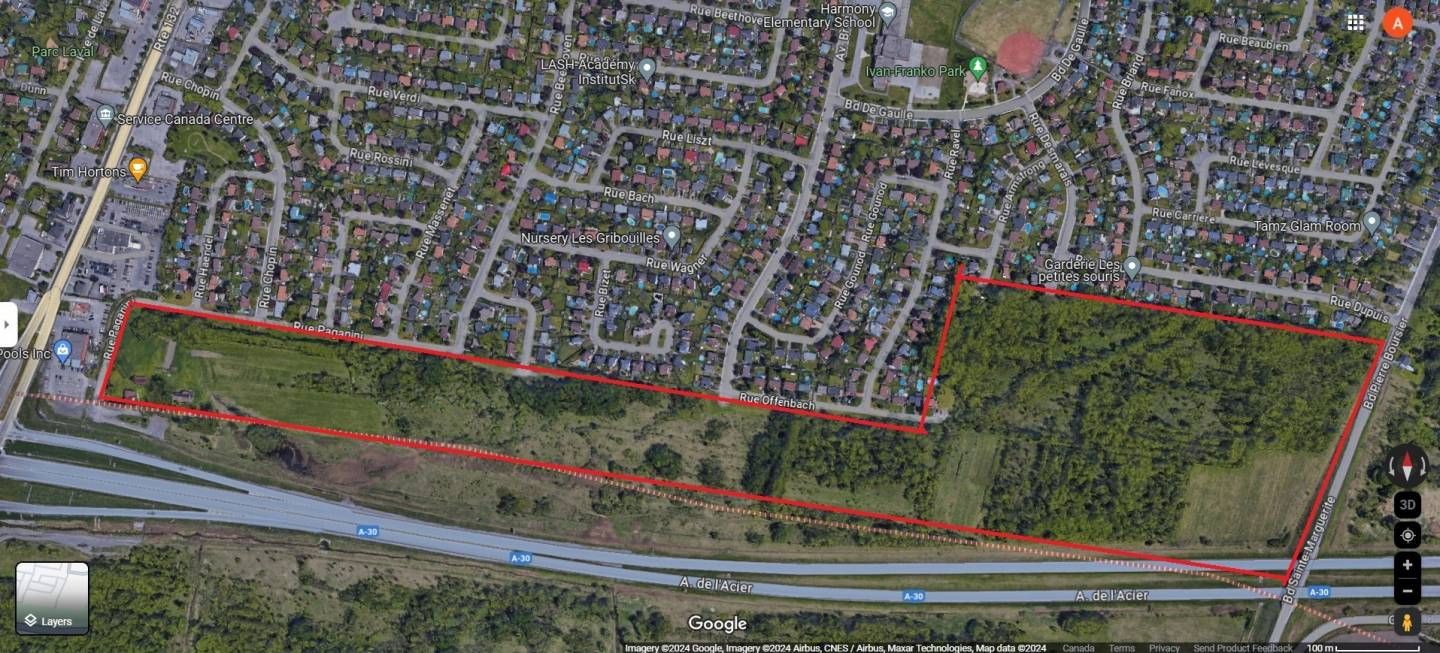Citizens Against Development of Faubert’s Land

The Faubert's land. (photo : Courtesy)
A group of Châteauguay residents is opposed to the development of Terre Faubert, Faubert’s Land, a woodland and wetland site along Autoroute 30 between Saint-Jean-Baptiste and Pierre-Boursier boulevards. The city wants residents to take part in drawing up the urban planning, but has cautioned that there will be residential development within the area.
Translation Amanda Bennett
Several residents turned up at the city council meeting on 15 April to ask elected representatives questions about their intentions for this part of the city. From the outset, Mayor Eric Allard warned them that his only answer to questions on this topic would be: “come to the public consultation in June”.
“What you’ve just said is unacceptable,” retorted Chantal Payant, a citizen, bemoaning the city’s refusal to answer questions. “The consultation is going to be used to answer questions. We won’t be holding the consultation tonight. We’re not doing it now because we are not ready,” replied the Mayor.
Consultation Process
The Faubert land belongs to a private owner who wants to develop it for residential purposes. The municipality is in the process of drawing up a specific urban development plan. During this process, residents can have their say on what they would like to see happen in the area.
The first workshop with residents was held in February. Nearly a hundred people attended and shared their comments. Those comments will be taken into account, said the Mayor.
“Save Faubert's Land”
Since then, residents of the neighbourhood abutting the woodland have formed the group Sauvons la terre à Faubert (Let’s save Faubert’s land) and want it to be preserved rather than developed. It includes woodland and wetlands. “This land, which could be used for agricultural projects, provides a number of important ecological services: a nature park, rainwater absorption, a filter for pollution from Autoroute 30, and a habitat for biodiversity,” wrote the citizens’ committee in a leaflet distributed in the neighbourhood next to the land. A petition is also circulating.
To date, the city has refused to specify the number of housing units planned for Faubert’s land.
“It’s not finished yet. We’re in the process of drawing up a specific urban development plan. There’s going to be development, but we’re at the stage of seeing how it’s done and how we can add more greenery,” Mr. Allard told the newspaper a few days prior to the municipal council meeting. He pointed out that the city requires developers to protect a minimum of 30% of the land surface area.
Wetlands and Woodlands
According to the MRC Roussillon regional plan for wetlands and waterways which was adopted in December 2023, there was talk of “building two and multi-family dwellings of 2 to 4 storeys [which] should make up to 2,600 dwellings available”, in Faubert’s land. “Despite being small in size, these wetlands generally have good conservation potential, and protecting them would make it possible to maintain their role as a pollution filter and landscape enhancer for the residential and agricultural sectors they separate,” the document stated. It also indicated that Faubert’s land is one of the last “sizeable pieces of land yet to be developed in Châteauguay”.
Lucie Laberge, the municipal councillor for the district where the site is located, urged residents to be open-minded, as the developer “is also very open” when it comes to the environment. She alluded to parks and bicycle paths. She also pointed out that the 4-storey buildings were planned along Highway 30. “There it is, our sound barrier that we’ve been demanding for years. I think we have a great opportunity to demonstrate our open-mindedness,” she commented.
Terre Faubert in a Nutshell
Terre Faubert belonged to the family of Jean-Yves Faubert. In the 1980s, a request was made to include 82 acres in the agricultural zone. The plan was to build a greenhouse, a cold store for vegetables and expand the strawberry fields.
Over the years, farming activities ceased and Autoroute 30 was built.
In 2019, the city applied to exclude 28.64 hectares from the agricultural zone for residential development. The Commission de protection du territoire agricole du Québec accepted the request, pointing out that the land, “Although it has very good soil potential, is subject to numerous regulatory constraints that severely limit the agricultural activities that could be carried out there”.